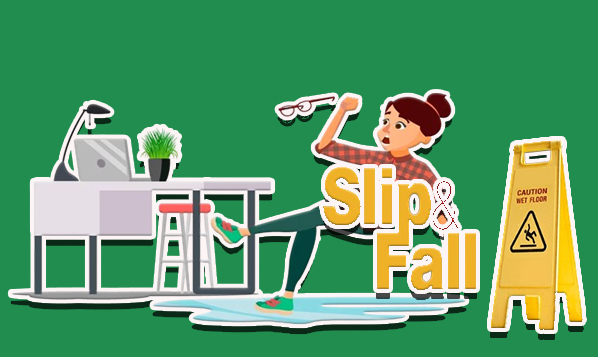A broad category of business insurance known as slip and fall insurance can cover your company from one of the most frequent types of accidents: a slip and fall. Imagine a slip-and-fall accident, like a cartoon character stepping on a banana peel, sliding on the floor, pin-wheeling, and crashing into a wedding cake.

This slapstick slipping is all fun and games in cartoons but slip-and-fall accidents are serious issues in reality. That is why is crucial for you to know the type of insurance that can cover slip and fall accidents. Depending on where your slip and fall accidents happened, different insurance policies may cover it. Furthermore, this article will delve into insurance plans that cover injuries resulting from slip and fall accidents.
What Insurance Cover Slip and Fall Accidents
Generally, a single type of insurance cannot cover all slip-and-fall accidents. To aid with the expense of medical bills, repairs, or even lawsuits, you’ll need different types of insurance. Moreover, this depends on who was involved in the accident and what kind of damage was sustained.
The following three primary insurance plans can cover you in any slip and fall accidents including General liability, workers’ compensation, and commercial property insurance.
General liability insurance
General liability insurance is frequently the first type of insurance that small businesses get. This coverage covers common workplace accidents, such as slips and falls, for clients and non-employees at your organization. For example, if a customer trips and falls at your establishment and breaks their wrist, you may be liable for their medical expenses. Furthermore, your liability insurance may help in paying some of the expenses.
Workers’ compensation insurance
Workers’ compensation insurance provides important coverage for workplace damages, including slip and fall accidents for employees. Over 200,000 employees suffered slip and fall injuries in 2020 that were severe enough to necessitate days away from work.
This coverage may provide financial support to an employer in case of an employee’s work-related injury. If an employee decides to sue you in court, it can also provide financial assistance in employer responsibility. Furthermore, general liability insurance protects third parties, such as clients or customers, who are injured on your property.
Commercial property insurance
If you own the building where you do business, commercial property insurance can protect your inventory, products, and equipment. Let’s say a patron trips over a damp patch on your floor and smashes into a pricey display case. Business property insurance covers display repair costs, while general liability insurance covers client injuries. If you cause property damage, this kind of insurance may also be able to help financially.
How to Avoid Slip and Fall Accidents Lawsuit
Adherence to safety precautions and emergency response skills significantly decreases the likelihood of slip-and-fall accidents. Furthermore, there are seven strategies to improve and prevent the likelihood of slip and fall incidents at work;
Supervise your workplace frequently
To ensure safety, it is recommended to conduct a monthly thorough cleaning of your workspace to eliminate any potential hazards or areas where clients may be present. Additionally, ensure that there are no broken or uneven surfaces, nor is the floor moist and slick. It is vital to ensure that no harmful objects are blocking the halls, workstations, or staircase.
Furthermore, keep electrical and other cords in positions where people cannot trip over them. Maintain clean paths and make sure that there is a slick resisting surface at entryways. In addition, make sure that during the winter you clean all of the ice and snow from outside walkways. Additionally, make sure there are no large cracks or potholes in your parking lot.
Document all hazards
Make sure you have a maintenance journal with all the dangerous issues and a method to destroy them. This can ensure the safety of your business and enhance your legal defense in case of a lawsuit.
Using warning signs
You can recognize several warning indicators to spot risky circumstances. For example, orange cones can notify your clients of any risky situations, while yellow can be utilized to signify a moist floor. Moreover, you shouldn’t remove the warning signs until the floor has thoroughly dried unless you’ve figured out a solution.
Install surveillance camera
A video camera system can record any mishaps and assist shield you from theft of any kind. Furthermore, by using this approach, the likelihood of a fictitious injury claim being made against your business is reduced.
Record and document every accident
When an accident occurs, it’s critical to record details about what happened, and who was involved, including the casualty and any eyewitnesses, in writing. In addition, you can also document the accident using a video or a digital camera.
Contact your insurance company
Your insurance provider may require quick access to the specifics of the accident. Moreover, if an injured party filed a claim, your insurance provider may help cover the expenses of your legal defense.
Furthermore, after a fall or other accident, you should prove your care for the injured person’s well-being. However, you should not assume responsibility for anything until you have reached your insurance provider and filed a claim.

